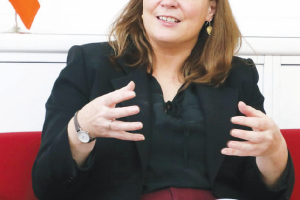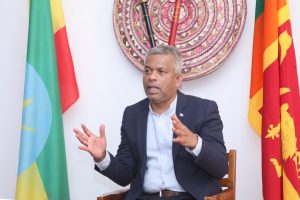
Kejela Merdasa
Today’s guest is Kejela Merdasa who is the Culture and Sport Minister of Ethiopia.
Kejela Merdassa, a politician from the opposition quarter, was included in the new cabinet of Prime Minister Abiy Ahmed. He was appointed as a Minister for Culture and Sports in October 2021. Just before he came to the cabinet, he had been an executive committee member of the Oromo Liberation Front (OLF).
The Ethiopian Press Agency made a short stay with Minister Kejela to learn more about federalism and the importance of celebrating Nations, Nationalities, and People’s Day (NNPD). And he touched on a range of points, including the constitution of Ethiopia, the federalism system, and other political thoughts. Have a nice read!
What is the contribution of celebrating Nation, Nationalities, and People’s Day in building the future of Ethiopia?
I believe celebrating this day helps Nations, Nationalities, and Peoples of Ethiopia to approach one another, know each other, cultivate togetherness, and share the good practices they have developed so far.
This year’s Nations, Nationalities, and Peoples Day has been celebrated in Jigjiga town, Ethiopia, Somali State. As part of the NNPD, there have been a symposium, and various study papers was presented and discussed. On this special day, NNPs are expressing togetherness and carrying out activities that cultivate their diversity to reinforce their unity and harmonious relations.
It is the right decision for the government of Ethiopia to ratify December 8 as the day of the Ethiopian Nation, Nationalities, and People’s. Just before 18 years, the primary reason for selecting the day was that it was a day that the nation, nationalities, and people are of Ethiopia ratified the existing FDRE constitution. This constitution is an instrument for the Ethiopian peoples to establish a federal government system and sign the contract that they had given to the government.
Hence, it is accurate of being December 8 a Nation’s, Nationalities, and People’s Day. This helped sink the rule of law into the mindset of the people. Because it gives a guarantee to the existence of each nation and nationalities, marking the day is quite imperative.
The Ethiopian constitution was ratified after getting the full support of the people. So observing Nations and Nationalities People’s Day independently shows that the day is a historic event.
Do you think that the previous regimes did not oppress people’s right?
Oppression was one of the causes that led to the birth of the Constitution. If there was no oppression, where can we invent or bring the word oppress? We know how it was undertaken practically. During the regime of Emperor Haileselasse I, the government had sovereign power. He considered the land and the people in this country to be his own property. This system oppressed the rights of the people. It saw the land and people equally. In the recent constitution, however, citizens are being treated equally before the law. I believe that the constitution responded to the inquiry of the people about oppression. The constitution assures that the people of Ethiopia have sovereign power.
In this constitution, the nations, nationalities, and peoples of Ethiopia have autonomous power. Now, there is no oppression supported by the law of the land. In the first constitution of Ethiopia, during the regime of Haileselasse I, there were many articles that show the oppression of the people.
Though the Derg regime called itself a democratic government, the constitutions provided autonomous power to one group. As it had not given power to the people, the constitution in the Derg regime had no point of connection with the existing one. In other words, the Constitution of Derg was a system that oppressed peoples’ rights. This kind of oppression forced the people to engage in various forms of struggles, and finally, the people gained the unconditional right to self-determination, including the right to secession. This is the result of long-term struggle of the people of Ethiopia.
Before the current constitution, the peoples had no right to develop and exercise their cultures, languages and identities; the people were abused. This oppression was a cause the birth of the constitution.
As a result, the states created a federal system based on the nations and languages. The nation and nationalities and people of Ethiopia were struggling to remove the previous system and they are now formed a federal system based on their ethnicity and languages.
Do you think that the concept of ethnic nationalism was not there before the Constitution became effective?
In previous regimes, there was nationalism. Even though there was nationalism, the nations and nationalities of Ethiopia were not treated equally in front of the law of the land. Today’s nationalism is connected with ethnic nationalism. It is based on the equality and unity of nations and nationalities of Ethiopia, but it does not give a chance to the dominance of one ethnic group over the others. The constitution strengthens multinationalism.
In this constitution, nations, nationalities, and people of Ethiopia have got the chance to help and respect each other. Diversity by itself is not a problem for Ethiopia. It is beauty for us. This constitution allowed us to build a country based on mutual respect and cooperation with one another. The constitution gives a power for each district and zone, and power to administer itself under the constitution.
So the constitution has been practically implemented. I believe that this constitution stands on its own two feet.
Those who need to build a unitary system said that celebrating the nations, nationalities, and peoples days endangered the unity of the people instead of strengthening federalism. How do you see this?
This is not an issue that requires special analysis. Before five years, following a change of government, there were some attempts to lead the country to a unilateral system of government. In order to do so, some parties expressed their interest, but they were not effective. What is needed for the present Ethiopia is multinationalism, but not unilateralism. In order to build a better Ethiopia, we assured that the implementation of multilateralism would bring a united and prosperous Ethiopia. However, this is not possible by applying unilateralism, and we have understood this clearly over the past five years. Though there have been two kinds of thoughts in Ethiopia, the concept of multinational unity has become a dominant thought that has been chosen by the people.
On the morrow of the government change, some groups were striving and chanting war cry to bring back the thought of their forefathers. All the trials to bring about the dominance of one group were off-target. As we have observed over the past five years, we understand that multinationalism is a concept largely accepted by the people. Those who support unilateralism were not able to bring it to action. As they said, celebrating nations and nationalities’ day will never be an obstacle to standing in unity. However, the concept of unity in diversity was taken as a grand concept in the minds of the people.
As they said, there should not be ethnic identity in Ethiopia, and it is enough to call someone a human. And this is a concept they tried to apply but failed. Because there is an ethnic group, every nation has organized itself under its own ethnicity. Being a human alone cannot express a human being, and that is the reason we applied the multinational system. They said being human was enough for us. They said this because they have the intention of bulldozing the interests of nations, nationalities, and people’s of Ethiopia. We have to respect the interests of the people but not impose any sort of thought without the willingness and interest of the people.
Identity can be expressed in religion, ethnicity, language, and culture. All people have the right to use their identities. Those who believe in the unitary system tried to twist it differently than it has been put in the constitution. They rather want to impose unilateral thought, which oppresses others. The people, however, expressed that they did not want a unilateral system and struggled for that. People who believed in the unilateralism system were assured that their way was not successful. The thought itself is an obstacle for them. Under the umbrella of Ethiopianism and unity, they tried to get people’s acceptance.
In order to get the attention of the people, a struggle should hold the truth and stand for people’s equality and justice. When they knew that they were not being accepted by the people, they twisted the multilateralism concept in order to gain hegemony.
If they had struggled for the assurance of democracy, human rights, and equality, they would have gotten people’s acceptance. They told the people that “we know which is good for you” or “the thought I brought for you is always right.” In this way, a party cannot be successful. Anyone can find the aforesaid thought in the unilateralism system. This sort of attitude is dismissed by the Constitution. As it does not give space for diversity and is a factor that arouses people to struggle, this kind of thought could not hit its target. Though they carry any sort of weapon and speak loudly in any media, they will not get acceptance by their people. As a result of this, their attitude has failed. The most important thing for the party to stay alive is the truth it holds, not the voice it repeatedly echoes.
In the present situation, it is impossible to impose one group’s dominance over the other. This is the idea that the constitution has underlined.
As their objective is a mistaken one, under the coverage of Ethiopanism, bringing ethnic or group dominance to Ethiopia is not possible. There are many reasons for this. One is that the people of their origins would not allow them to do so. The nations, nationalities, and peoples of Ethiopia are married to one another. They are now united. When you are struggling to bring one ethnic or group dominance, as the idea is a mistaken one, the people of Ethiopia don’t accept you. As it is a mistaken idea, it would never make them a winner. Accordingly, the idea failed by itself.
Second, in today’s Ethiopia, where the intellectual level of Ethiopians is at a higher level due to technological advancement, imposing such an attitude is impossible. The people can analyze and choose the most convenient attitude for them. Imposing such ideas on people is not legally accepted. It will not be profitable for those who believe in a unilateral system.
One ethnic leadership system always fails because it is well known by the people. The people of Ethiopia are now a civilized society; hence, it is imperative to think at that level.
Those who want to impose the unilateral system in Ethiopia try to utilize the people who have detestation. A political attitude based on detestation would never be acceptable. Every nation needs togetherness based on unity, cooperation and adoration. But no one needs togetherness based on oppression.
If you want to add any more points, please take a chance.
As we are observing this year’s Nations, Nationalities, and People’s Day, we have to demonstrate peace, love and togetherness. For this to happen, concerned bodies should discharge their responsibility. The diverse cultures, way of dressing, way of living and the like to be demonstrated on this day should be sustained in the future. I, finally, want to congratulate the peoples of Ethiopia on the 18th Nations, Nationalities, and Peoples Day.
Thankyou
It’s my pleasure.
BY GIRMACHEW GASHAW
THE ETHIOPIAN HERALD SATURDAY 9 DECEMBER 2023




